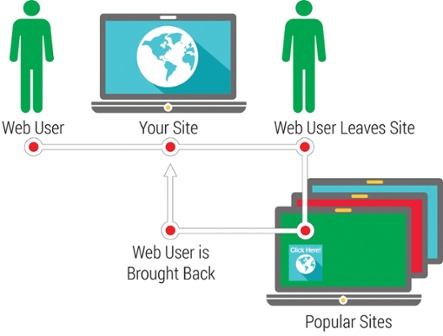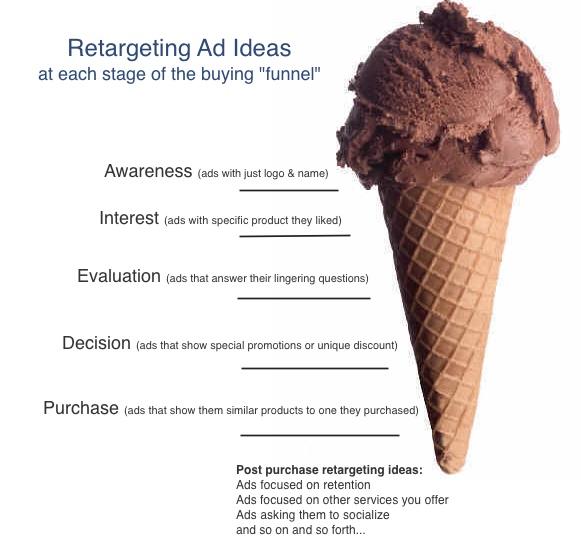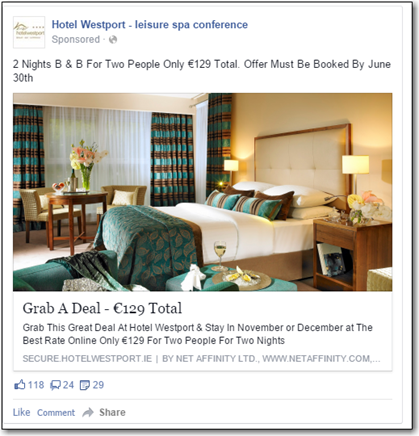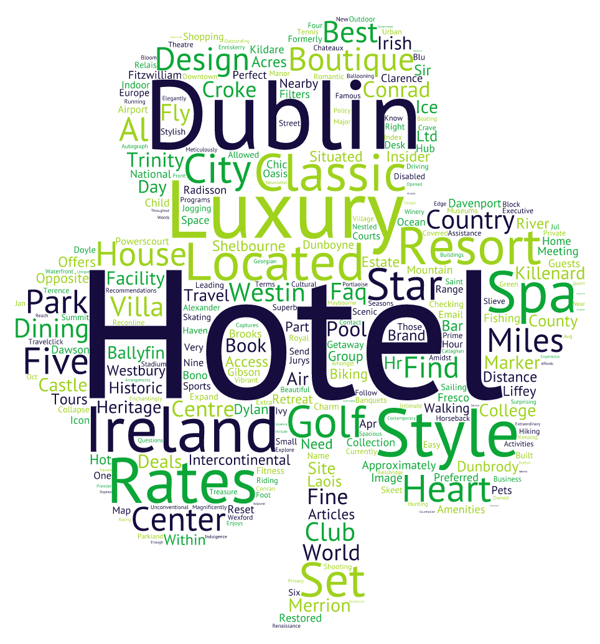Increasing direct bookings is a top priority for hoteliers.
So, when guests browse your website and leave without booking – or if they start to book but abandon the process halfway through – it’s important for you to re-engage those individuals.
Retargeting ads can bring back and convert guests who abandoned your hotel’s site. To get the most out of your advertising spend, give hotel retargeting campaigns a try.
But what exactly is retargeting, and how can it save you money while snagging you those extra bookings?
Let’s take a look.
How Does This Work?
Retargeting reminds guests about your hotel brand after they leave your website.
For example, when a husband searches for a hotel for his upcoming wedding anniversary, he browses through several pages of your website, like the photo gallery and spa services. He likes what he sees but, distracted, the husband might leave without booking.
Retargeting campaigns then display the hotel’s ads on other well-known sites he visits. The ads help bring the husband back to the hotel’s website to complete his room reservations.
Here’s a visual of the retargeting process:
Image source
How Does This Benefit Your Hotel?
Starting a new marketing tactic may raise red flags. Like, will this achieve results? Or, how will this affect my budget?
Retargeting is a quantifiable technique that can be measured. Plus, it’s cost effective. It redirects your current advertising dollars to guests who are already interested in your hotel.
Here are a few key benefits of retargeting:
- High ROI: Website visitors who are retargeted with display ads are 70% more likely to convert.
- Differentiated Offers: Market targeted offers to interested guests. For example, if a guest specifically visited your golf package page and didn’t purchase it, you can now offer a discount tailored to that package.
- No Rate Parity Issues: Guests will see unique offers. Therefore, everyone can’t access special rates.
Increase Your Hotel Bookings
Retargeting is a powerful marketing tool that can increase your direct bookings. Take advantage of today’s technology by sending customized messages to your potential guests.
Here are five ways you can use retargeting:
1. Site Retargeting
Site retargeting is the most popular retargeting tool. As discussed above, retargeting is intended to reach guests who have already visited your site.
Retargeting ads differ from more traditional display media in a couple ways. They “guarantee that you only spend ad dollars on people who have previously visited your site.”
You don’t want to stalk your guests. To benefit the most from site retargeting, it’s recommended that you only tag pages relevant to the conversion process. This might include the pages for your booking engine, or landing pages for specific offers. We also always recommend frequency caps as a best practice, so your potential guest doesn’t see your ads more than, say, once a day.
Retargeting is helpful at every stage of the purchasing funnel. Instead of guessing where a guest fits within the funnel, retargeting offers you actual data. Now, you can target consumers at a set time with a personalized message.
The image below offers a few retargeting ad ideas.
Image Source
2. Email Retargeting
Email is an effective way to follow up with consumers. Through email retargeting, you can persuade prospective guests to click that “Book Now” button.
Email retargeting starts when a guest starts the booking process on your site, but doesn’t follow through with the purchase.
This is why we recommend getting an email as early as possible in the booking process: without an email, following up if they abandon the booking is a lot more difficult. If the person is in your email database, your hotel can easily send an email reminding him or her to book the reservation. To entice the purchase, you also might offer a discount or bonus gift.
“Email retargeting depends on successfully identifying the steps a subscriber needs to take to become a customer, and creating personalized content for each one of these,” writes Daniel Hristov, CEO of Aurasel.
By customizing messages, your hotel chain can deliver value and receive higher conversion rates from your email list. If you’re stumped with the process, NetAffinity specializes in helping hotels with email retargeting ads.
3. Contextual Retargeting
Contextual retargeting offers companies with similar customers to advertise on each other’s websites. So, if a visitor leaves a site and lands on another, the ad is displayed on the second site.
For instance, if a guest is searching for rooms on your hotel’s website and then leaves to locate airline tickets, your hotel’s ad will display on the airline’s page.
This technique works because contextual retargeting is based on interests and demographics. Since the brands offer different services to similar audiences, it’s a win-win situation without the high cost of advertising.
Image Source
Creating content also can capture consumer interest. Articles discussing travel tips and upcoming events will encourage readers to engage with your brand. The Killashee Hotel offers guests fresh, updated content via its blog.
The key is to identify visitors for future ad targeting.
4. Social Retargeting
Social retargeting lets you display ads to people who left your site and decided to browse social media channels, like Facebook and Twitter.
About 54 percent of marketers believe that “social retargeting was a better use of resources than mobile, search or even email retargeting.” In addition, it leads to more than double the conversions!
Crafting social media messages lets you interact with customers in a different setting. While checking Facebook posts, guests are more relaxed as they connect with friends and review the latest trends. This means your hotel can experiment with friendlier tones and styles.
It can be tricky to find the right tone for your hotel on different channels. For example, on Twitter, there’s a balancing act between the information you want to convey and the character limit, and on Facebook your hotel needs to be professional while still being accessible. Don’t be afraid to experiment with different styles until you find the right tone for your hotel on each social media channel.
The stronger your brand on social media, the more effective your social retargeting ads will be. If someone sees an ad for your hotel on Twitter, they might go check out your page—you don’t want them to see that your last tweet was in 2012!
The example above is a Facebook ad by Hotel Westport. From this social retargeting campaign, the four-star, family-owned hotel estimated revenue was 61% greater than what they spent.
Social retargeting is great for improving hotel brand exposure as well as sales.
5. Search Retargeting
Search retargeting is a little different than the other types mentioned. Instead of focusing on guests who visited your website, search retargeting aims to reach new customers interested in your hotel.
It works by targeting users who search for keywords related to your hotel, but have never visited your website. For example, your ad may appear to customers who have searched for “best hotel spa” or “hotel Dublin.”
Avoid the urge to start with a narrow keyword set. Use several different keyword tactics for your initial campaign.
Try competitors’ terms, branded terms, and lower funnel phrases. Once you retrieve the data, only use the highest-performing keywords.
If you want to gain the attention of new consumers, search retargeting achieves that goal.
Book More Guests
If you’re ready to re-engage guests and increase your ROI, retargeting is the best fit for your hotel’s marketing strategy.
Opportunity exists for you to increase bookings without sacrificing the budget. From site to search retargeting, several options are available to show off your hotel’s brand and amenities.
Lure consumers back to your site with personalization and special offers. Retarget to book more guests.
How has your hotel used retargeting? Have you seen results? Let us know!








